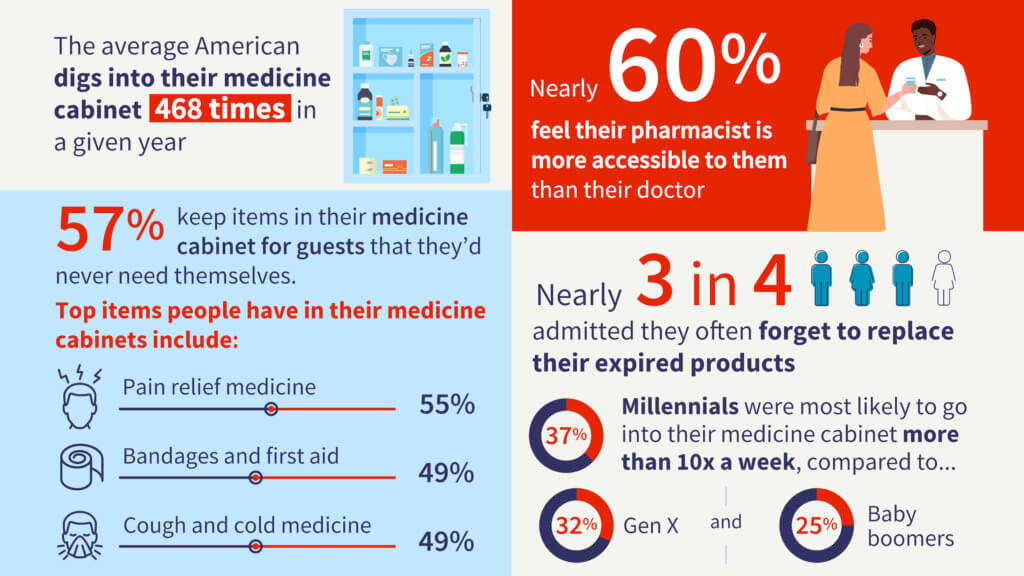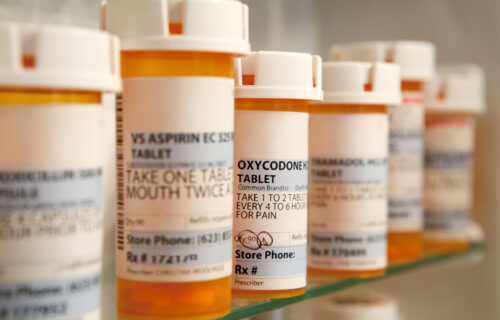NEW YORK — The average American digs into their medicine cabinet 468 times in a given year, according to a new survey. The poll of 2,000 respondents reports that the average medicine cabinet contains an average of 15 products. However, nearly three in four (74%) respondents admit that they often forget to replace their expired products.
Conducted by OnePoll on behalf of Walgreens, the survey also shows that 64 percent of respondents have placed these items in the back of their medicine cabinet and forgot about purchasing them. Meanwhile, 55 percent typically don’t even think to check the expiration dates of these items in the first place.
More than half (57%) say they have items in their medicine cabinet they would never use themselves and are reserved specifically for guests. Millennials are most likely to go into their medicine cabinet more than 10 times a week (37%), compared to Gen X (32%) and baby boomers (25%).
What’s in America’s medicine cabinets?
Top items most people have at the ready in their medicine cabinets include pain relief medicine (55%), bandages and first aid (49%), and cough and cold medicine (49%). Sun care and dental products (54%) ranked high among Gen Z respondents, while the majority of millennials (49%) and Gen Xers (59%) focused more on pain medication.
Product preferences differ not only by generation but also by season, as two-thirds of those surveyed (67%) report curating their medicine cabinets for each season by swapping out cold and flu medicine for sun care products.
Sixty-five percent have also recently been stocking up more on health and immunity-boosting products. The top picks included Vitamin C (50%), multivitamins (47%), and Vitamin E (44%). When asked what supplements they can’t live without, people named an array of vitamins, as well as ginseng, allergy medicine, calcium, CoQ10 and probiotics, among others.
“Our research confirms the growing trend of using vitamins, minerals and supplements to help reach your wellness goals,” says Andrea Collaro, senior director of health and wellness owned brands at Walgreens, in a statement. “Your local pharmacist can help you find brand supplements or products from other categories, such as pain or allergy relievers, that work best for your needs and come recommended by pharmacists.”

Trusting the pharmacist over the doctor?
Respondents also shared thoughts on their local pharmacies, with nearly two-thirds (64%) saying they’re comfortable asking their pharmacist for recommendations on supplements or medicine. Nearly 60 percent feel their pharmacist is more accessible to them than their doctor, with millennials more likely than Gen X to say so (63% vs. 52%).
Those surveyed trust their pharmacist’s opinion on what supplements or medications work best (58%), how to take medicines (51%), and how to address various skin problems (49%).
“Pharmacists are a valuable resource to help answer questions on medications and proper dosage without having to wait to see your doctor,” adds Collaro, who is also a pharmacist. “Pharmacists can explain how to take your medications, use a medical device like a blood pressure monitor or blood glucose meter, recommend the right over-the-counter products for you, and also deliver vaccinations.”
